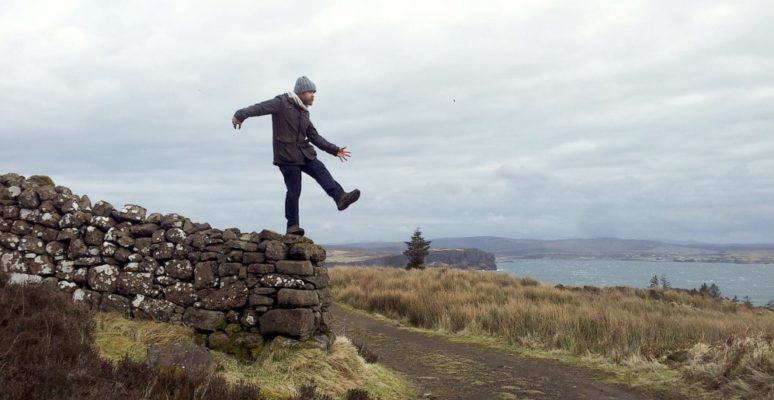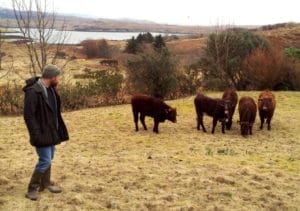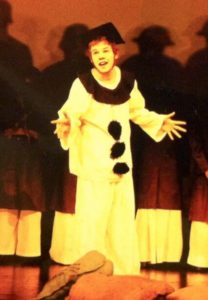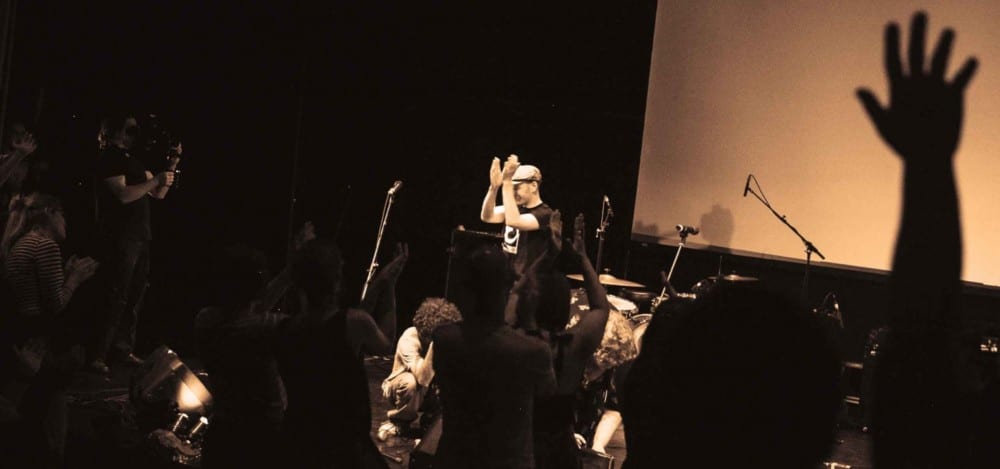
The quietest room in the world is also the least peaceful. The anechoic chamber in Redmond, Washington has a background noise level of -20.6 decibels; sit inside with the door closed and you can hear your blood circulate and your joints grind. Most people can’t stay in there more than a few minutes, the longest anyone has managed is an hour. Humans simply weren’t made for that degree of stillness.
There wasn’t much of a gap between writing my musical Jocasta and recording the soundtrack album. Indeed, the last song was written in November 2016, the book’s first draft completed in December and studio production began in January. Recording happened in the daytimes throughout February and March and I worked on the second and third drafts of the script in the evenings. Once the album was mixed and mastered we went straight to the live show and record release; when that was done it was time to promote and tour. I like moving about so this kind of schedule suited me pretty well, but I must admit towards the end I was looking forward to some proper peace and quiet. After nearly three solid years spent on this one project, however, the quiet that awaited me was far from peaceful. It was like I had found my own personal anechoic chamber.
The default (but usually unconfessed) feeling among most British people is that they are either a fraud or a failure or a messy mixture of the two. Very few of us feel we have any inherent value and what precious value we hesitantly suspect we might possess tends to fluctuate at the mercy of cultural whims and fashions. Nothing feels very secure so we do our best to insulate ourselves from the uncertainty and angst with all sorts of complicated distractions: earning lots of money, writing ironic love songs, developing an interest in steam engines, substance abuse, voting to leave the EU… the options stretch out into infinity.
But silence is something we are never prepared for. After all the Jocasta fuss was over I have to admit I struggled. I wouldn’t go so far as calling it a breakdown – more of a slow puncture – but whatever happened, I lost my momentum and my imagination and the confidence to reclaim either from whatever had snatched them away. The very city I lived in (Manchester – a place I’d moved to fifteen years earlier specifically because of its inextinguishable creative spirit) was a constant humming reminder of all the ways I was failing to pull myself out of this quicksand.
 If you follow me on Instagram you’ll know what happened next. I moved to a hillside on the Isle Of Skye and filled my days with scything bracken, mending fences and feeding birds. Many would suppose such an environment cannot compete with the excitement of Manchester but the other day five lost cows got into the garden and no amount of Hacienda memorabilia can help in a situation like that.
If you follow me on Instagram you’ll know what happened next. I moved to a hillside on the Isle Of Skye and filled my days with scything bracken, mending fences and feeding birds. Many would suppose such an environment cannot compete with the excitement of Manchester but the other day five lost cows got into the garden and no amount of Hacienda memorabilia can help in a situation like that.
 Anyway, bovine trespass aside, the fresh air and change of rhythm revived my spirits and I began work on a new musical, this time about Theatre Workshop founder Joan Littlewood. Years ago I had played the MC in a production of Oh What A Lovely War (pictured) and her philosophy on modernising/reshaping theatre, breaking down the stubborn class divisions and generally giving UK drama a kick up the arts resonated with me a great deal. So how about a musical in the style of Theatre Workshop all about her?
Anyway, bovine trespass aside, the fresh air and change of rhythm revived my spirits and I began work on a new musical, this time about Theatre Workshop founder Joan Littlewood. Years ago I had played the MC in a production of Oh What A Lovely War (pictured) and her philosophy on modernising/reshaping theatre, breaking down the stubborn class divisions and generally giving UK drama a kick up the arts resonated with me a great deal. So how about a musical in the style of Theatre Workshop all about her?
So I read a bunch of books, made a lot of notes and put together the beginnings of a treatment; I was starting to get a real sense of the colour of the thing when one day the RSC announced their brand new musical: Miss Littlewood. I grabbed the scythe and trudged up the hill, imagining every bracken stem to be the neck of Miss Littlewood‘s perfectly innocent composer.
My friend Andrew Ab once told me ideas don’t belong to anybody, they just float around and land on people, sometimes a lot of people at once. So one cannot feel too thwarted by these occasional reminders that one isn’t necessarily as fresh and original as one might hope (indeed, the very same week I launched my Jocasta musical Natalie Haynes’ brilliant novel The Children Of Jocasta was published – the particular muse responsible for retelling ancient myths was clearly hedging her bets in that instance).
Still, this blog is not designed to be a “I would have done this but that happened”, rather an explanation of recent quiet after so much buzz in previous years. I am happy to announce I am now working on a new musical, this time about the final years of Antonin Artaud, provisionally titled No More Masterpieces. He is a fascinating individual, simultaneously a crazed monster, terrifying in his passions, yet also a hapless innocent, pitiable victim and relentless self-saboteur. He never achieved any of the things he set out to do but ultimately made a profound impact after his death. Psychologists could no doubt draw conclusions about why I am drawn to this subject – I freely admit this tangle of personal failure and public legacy appeals to the petty ego of my own caged ambitions, ugly stunted creatures that occasionally need feeding. Mostly though I am attracted to the period – that amazing time between the world wars when so many philosophies and artistic movements are breaking through only to be smashed down once again by fascism, creaking empires and the deadly frictions of opposing ideologies.
Not so very different from the times we find ourselves living in right now.
And in such times the one thing we must not do is stop.


